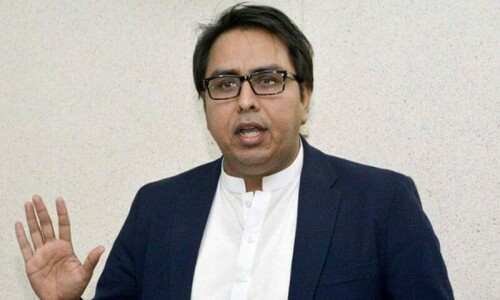LAHORE: The climatic changes, yield gap, high input cost, declining water supplies and persistent energy crisis are a few issues that afflict the agriculture sector in Punjab and Pakistan, so said Dr. Farukh Javed, provincial minister for agriculture.
Speaking at the inaugural session of Dawn Sarsabz Agri-Expo here on Thursday, the provincial minister claimed that the government was aware of all these pressing issues, was working on them and would do everything possible to lead the sector out of the current crisis.
He said the experts on climatology claimed that average temperature could rise by half-a-degree Celsius in the next 20 years, and slash crops yield by 15 per cent.
Javed said: “This is the biggest challenge to the sector and the government is striving for new technologies to mitigate the impact. The National Assembly has already approved the Seed Act, which will soon go to the Senate to become law of the land; other follow-up actions would follow soon to revolutionise the seed sector, and reduce the impact of climate.”
Speakers come up with solutions to agri challenges
He said the government was also shifting 20,000 tubewells to bio-gas to deal with energy crisis and 80,000 more would be run on bio-gas in the next four years.
Later, the minister, along with US Consul General Zachary Harkenrider and Director Marketing Fatima Group Muhammad Zahir, inaugurated the exhibition at the Expo Centre. Addressing the conference, Mr. Harkenrider assured continued US support for the agriculture sector, particularly for increasing productivity and profitability and collaboration with key stakeholders on the either side.
“USAID is working directly with farmers and businesses to impart latest techniques and best practices to increase yields, and, in turn, incomes. The agency also works with producers to improve harvesting, packaging, and marketing so that their final products meet highest quality standards, both here in Pakistan and abroad. Through strategic work with universities and research institutes, the agency addresses limits to agricultural productivity by conducting and disseminating the latest research and technologies throughout the sector as well as working with Pakistani government counterparts to help address policy issues.” he said.
Muhammad Zahir of Fatima Group, the main sponsor of the event, was of the view that Pakistan had to take care of its plants health through site-specific fertiliser and invest in new technologies – Geographical Positioning Systems and Geographical Information Systems – to improve efficiency of fertiliser and water resources. With the help of these technologies, the water efficiency could be improved from current 15pc to 90pc, and so could be done with fertiliser as well.
He said the use of balances and site-specific fertiliser was necessary to improve health of plant and save soil’s fast depleting resources. “Only with such steps, the country could save its soil for posterity,” he said.
Syed Samar Husnain, executive director of the State Bank of Pakistan, told the participants that for the first time in Pakistan’s history, the formal sector committed Rs500 billion loan, which constituted 50pc of total loan requirements of the sector: out of these Rs500 billion, Rs289 billion had already been dispersed –32pc more than the corresponding period pf last year.
“The bank is working on two-pronged strategy, which includes improving regulatory environment and market development. It is also encouraging sectors like warehouse development and crop and livestock insurance and hopes to develop the sector,”he said.
Earlier, Masud Hamid, director marketing of the Dawn Group, in his welcome note renewed the pledge of his group to continue creating such forums, where different stakeholders could interact with each other and policy issues could be debated.
Published in Dawn, March 20th, 2015
On a mobile phone? Get the Dawn Mobile App: Apple Store | Google Play














































Dear visitor, the comments section is undergoing an overhaul and will return soon.